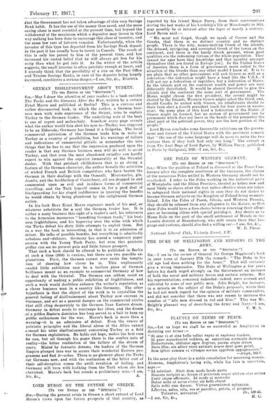FUTURE OF GREECE.
Ta "BrECTiTOR.")
Greece a short extract of Lord prospetts of that country, as reported by his friend Major I'arry, from their conversations during the last weeks of his Lordship's life at Missolonglti in 1821. may possibly be of interest after the lapse of nearly a century. Lord Byron said :-
" We must not forget, though we speak of Greece and the Greeks, that there is no distinct country and no distinct people. There is the wily, money-making Greek of the islands, the debased, intriguing, and corrupted Greek of the towns on the continent, and there is the hardy Greek peasant, whose good qualities are the redeeming virtues of the whole population. They cannot for ages have that knowledge and that equality amongst themselves that are found in Europe [sic]. In the United States of America there is a form of government more suited to the situation of the Greeks than any other model I know of. It is to me plain that no other government will suit Greece so well as a federation—the federation might have a head like the U.S.A.—I will not say a federation of republics, but a federation of States. In the islands and on the continent wealth and power are very differently distributed. It would he absurd therefore to give the islands and the continent the same sort of government. The Morea might choose the first president, the second might be elected by the Islands, Western Greece might select the third, and, should Candia be united with Greece, its inhabitants should in their turn elect a fourth president (each for four years in succes- sion). On some plan of this kind a federation of the States of Greece might be formed, but no system of government can he permanent which does not leave in the hands of the peasantry the chief part of the political power, they are the best portion of the people."
Lord Byron concludes some favourable criticisms on the govern- ment and future of rho United States with the pertinent remark that " the use of the some language will do more to unite the two nations than if they both had only one king." The extract is from The Last Days of Lord Byron, by William Parry, published
in Paris by Galignani, 1826.—I am, Sir, &c., Z.


































 Previous page
Previous page